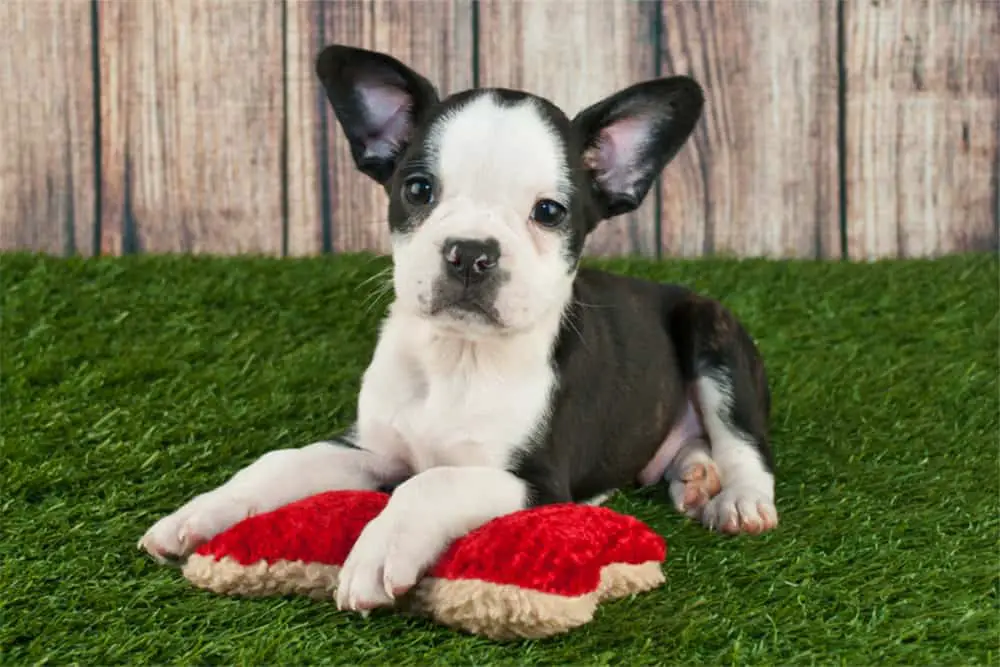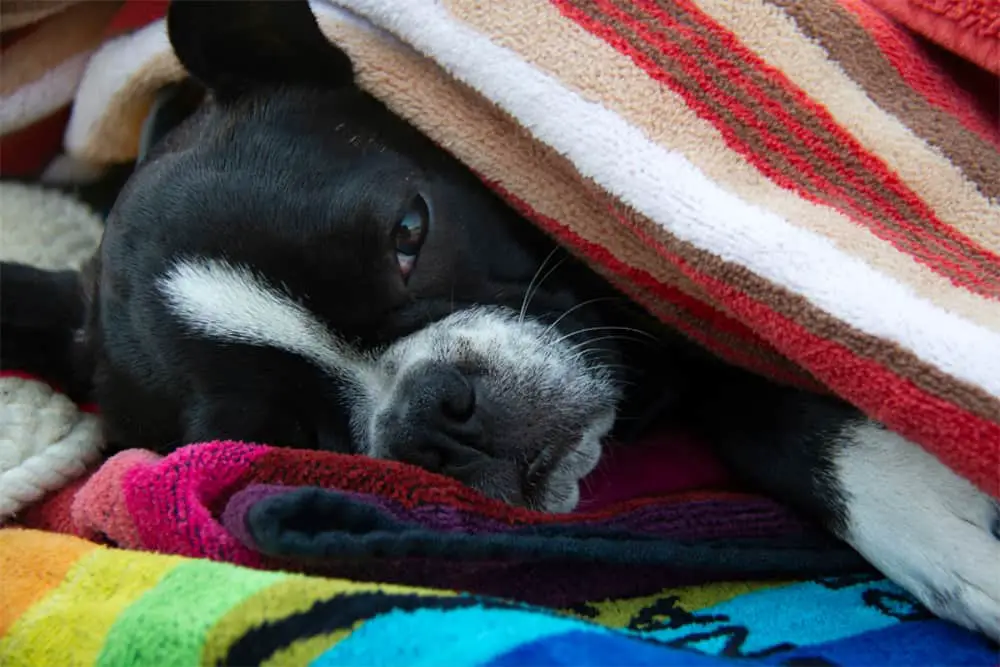Whoever it was that first coined the idiom about not being able to have the best of both worlds, had never met the Frenchton.
Which is hardly surprising as that particular phrase is hundreds of years old, and the Frenchton is a relatively new addition to the designer breed catalog of crossover dogs who are imbued with all of the eccentricities, charisma, and personality of both branches of their family tree.
Don’t be alarmed by the fact that you haven’t heard much about Frenchton, or that there isn’t a lot of easy-to-find information about this amazing little dog, as they’re one of the best-kept secrets in the canine lover’s world.

The plucky little Frenchton is a Boston Terrier and French Bulldog mix that goes by a number of different names that you might be more familiar with. Have you heard of the Boston Bulldog, the Frenchie Terrier, or the Frenchbo? You have?
Good, then we’re singing from the same four-legged hymn sheet, and we’re assuming that reason you’re here is that you want to find out as much as you can about this dog in order to satiate your curiosity or to arm yourself with a wealth of knowledge about the breed before you invite one of these natural-born dynamos to join your family.
Before you do decide to adopt or shop for a Frenchton, there are a couple of things that you’ll need to be aware of before we plunge headlong into the definitive guide to the Frenchie Boston crossbreed.
As they’re a designer breed, the Frenchton isn’t recognized by the AKC (American Kennel Club), so your pup won’t come with any pedigree papers and won’t be able to enter any officially sponsored shows.
They’re family dogs, they’re not show dogs and much as you’ll want to pamper the newest member of your family and spoil him, he’ll never bring home a rosette and you’ll never be able to add a trophy with his name on to your mantel.
It’s also vitally important to know that the Frenchton while having a slightly longer snout than a French Bulldog is a brachycephalic dog, which can present a whole host of potential health problems that you’ll need to be aware of before deciding if a Frenchton is a right dog for you and your family, and whether you’re the right fit for one of these surprisingly energetic little dogs.
Now that we’ve ticked all the basic fact boxes, it’s time to plunge headlong into the world of the Frenchton. Are you ready? Then let’s begin…
History
This is where the waters get a little cloudy, as no one really seems to know for sure when the first Frenchtons appeared on the canine radar. Officially, most breeders seem to think that they appeared sometime in the mid-1990s, but they could have been around for a long time before that.
The generally accepted rule of thumb is that the first purpose bred Frenchton’s made their debut in the decade before the dawn of the new millennium, and almost as soon as they appeared, they became one of the must-have designer dog breeds for Frenchie and Boston fans alike.
And demand soon began to outstrip supply which brings us to our next point…
Why Do Frenchtons Cost So Much?
Following on from our last point, the age-old problem of demand outstripping supply is the primary reason why Frenchton’s are so expensive.
Puppies can cost anywhere between one and three thousand dollars, and as the demand for these dogs is always so high, most of the recognized and registered breeders have a waiting list that you’ll have to join, which can mean that you’ll have to wait anywhere between six months and two years for your Frenchton to arrive.
Did we just say that there was a registered breeders list? But didn’t we also say that the Frenchton was recognized by the American Kennel Club, and if the breed isn’t recognized by the AKC how can there be an official registry of breeders?
We did say those things, but just because the AKC doesn’t officially recognize the Frenchton, it doesn’t mean that it isn’t recognized by other official bodies, it is.
The Frenchton is recognized by the IDCR (International Designer Canine Registry), the DBR (Designer Breeds Registry), and the DDKC (Designer Dogs Kennel Club). Being a pedigree breed might come with a certain distinction and the AKC’s approval, but it hasn’t hampered or held the Frenchton back.
Registering A Frenchton
As the breed isn’t recognized by the American Kennel Club, you won’t be able to register your Frenchton.
And despite the fact that the breed has been acknowledged by the other canine organizations that we’ve mentioned, none of them actually support registration, so your Frenchton won’t have, and doesn’t need any pedigree papers.
You will however need to get a dog license if you’re going to bring a Frenchton home as it’s still a legal requirement in almost every state. If you want to own a dog, you’ll need a license to make the arrangement legal.
How Long Do Frenchtons Live?
Frenchtons, like all smaller dogs, usually live a lot longer than big dogs do. And, as awful as it sounds, one of the reasons why a lot of Frenchie fans have fallen head over heels in love with this designer breed is because Frenchtons, on average, tend to live two to three years longer than French Bulldogs do.

If you’re going to give a Frenchton a home, you can expect to become a full-time pup parent to your newest family member for anywhere between twelve and fifteen years.
They’re hardy and resilient little dogs and their relatively long lifespan is a reflection of the breed’s inherent toughness.
Are Frenchtons Healthy?
As we’ve already mentioned, they’re brachycephalic dogs, so they might encounter some respiratory issues (especially during hot weather and after periods of prolonged exercise) so you’ll need to be aware of what looking after and caring for a brachycephalic dog breed entails before you start searching for your Frenchton.
While they’re a generally healthy little dog that refuses to be hampered or held back by their physical limitations, they are prone to some breed-specific genetic conditions, which in the Frenchton’s case means that they can contract any of the ailments that either Boston Terriers or French Bulldogs are susceptible to.
Some of the more common problems that can raise their ugly heads during a Frenchton’s lifetime are the aforementioned respiratory issues, cataracts and eye infections, digestive problems, epilepsy, and cancer.
While it isn’t a given that your Frenchton will develop any of these life-changing and threatening issues, we’d always recommend that you insure your dog to help with the cost of any, and all veterinary costs that your dog will accrue during its long, happy, and (hopefully) incredibly healthy life.
What Does A Frenchton Look Like?
You know what Boston Terriers and French Bulldogs look like, don’t you? Imagine a dog that sits somewhere in the middle of both, but is slightly closer physically to a Frenchie than a Terrier, and you’ll have a pretty good idea of what this adorable little pup looks like.
They tend to be slightly bigger than the average French bulldog, have a longer snout, but they have the same flattish faces, eyes that it’s impossible to say no to, and ears that are always standing to attention, and an uncanny zest for life and adventure.
How Big Are Frenchtons?
Seeing as we’ve already mentioned that they tend to be a little bigger than French Bulldogs, it’s probably the right time to go into a little more detail about how big your Frenchton is likely to be.
Frenchtons usually stand between eleven to fourteen inches tall at the withers (that’s the space immediately between the shoulder blades) and on average can weigh anywhere from fourteen to twenty-five pounds.

As is par for the course in the canine world, males tend to be bigger and heavier than females do, but given their parentage, they’re never going to be the biggest dogs in the yard.
The Frenchton Coat – What Does It Look Like?
Frenchtons are short-haired single-coated dogs, who follow and adhere to the same patterns and colors as their parents. They’re usually either brown, black, white, or cream or a combination of all of those colors, and in some rare cases can also be a slightly bluish shade of grey.
They can be any of the colors that a Boston Terrier or a French Bulldog can, and are usually a glorious combination of two or more of them.
The Frenchton Temperament
They’re ideal family dogs, as they’re affectionate, loyal, and love to spend time with their nearest and dearest, cuddled up on the couch, snoozing and watching the world go by.
They also have boundless energy when they’re awake, and are prone to zoomies and running around in circles when they’re taken on the adventures that the breed craves and enjoys.
However, Frenchtons like the side of their parentage that shall not be named (cough, Frenchies, cough) can also be stubborn and strong-willed, which means that they can be cute and infuriating in equal measure and can, and often do draw a line in the sand with their families and refuse to cross it unless they’re offered a reward or some sort of tasty treat.
The Curious Case Of The Frenchtons Ears
One of the breed’s most incredibly odd and endearing qualities is its ears that always seem to be alert and ready to pick up the fainted sound.
When they’re born, Frenchtons ears are flat and flush to their heads and don’t actually begin to perk up and stand to attention until they’re about six weeks old.
Of course, the chances of you actually seeing a newborn’s ears are slim to remote, as by the time that most breeders will actually let a puppy go, they’re already ten to twelve weeks old, by which time their ears have assumed the straight up and ready to go position that the bred is famous for.
The Elephant In The Frenchton Room
It’s probably time that we addressed the elephant in the Frenchton room, and that’s the size of, or rather the lack of it, of their tails. Contrary to rumor and urban dog mythology, Frenchton’s tails aren’t docked by breeders, they’re just naturally short.
In most cases, Frenchton’s tails are so short that they’re barely more than a little nub that wags excitedly whenever they see their families, are about to go on a walk or their dinner bowls are about to hit the floor.
Actually, now that we come to think of it, Frenchtons tails are almost always a teeny, tiny blur of excited happiness and unmitigated joy.
Did We Say Walkies?
Don’t let their lazy couch-bound demeanor fool you, Frenctons have a lot of energy that they need to burn off and use up, and if they don’t… Well, let’s just say that it’ll probably be directed elsewhere and you’ll probably end up buying an extra couple of pairs of slippers and shoes to replace the ones that have been ripped to shreds and chewed beyond repair.
Frenchtons need at least an hour of exercise a day, which should ideally be split between two walks, one in the morning and one in the evening.
As long as they get enough exercise, you’ll probably never have to worry about shoe shopping at the most inconvenient moments. The operative word being probably, as they do love a good shoe, and find it hard to resist a misplaced slipper.
The Trail Of Fur – Do Frenchtons Shed?
Frenchtons are a short-haired breed of dog, and as such don’t really shed a lot.
They do shed, nearly all dogs do, so you’ll have to be prepared to weep up dog hair and find fur on the couch, in your bed, and on your clothes, but compared to a lot of other dogs, they’re incredibly light shedders.
A good, ten-minute brush twice a week should reduce the amount of hair they shed and enable you to take some time off from chasing around after your Frenchton frantically trying to vacuum up their hair as they casually deposit it around your house.
And while we’re the subject of Frenchton fur, we feel that we should really address the other urban myth that has somehow attached itself to this dog. They’re not hypoallergenic, and they’re not a suitable companion for anyone who suffers from any form of dog allergy.
Do Frenchtons Drool?
They do. Like every other brachycephalic breed of dog, Frenchtons tend to drool quite a lot.
They drool when they’re waiting for their bowls to hit the floor, when they’ve finished drinking and when they’re staring up at you waiting for you to give them some of your cookies.
Because their muzzles are so short, the shape of their mouths makes them prone to drooling, so if you’re going to live with a Frenchton, you’ll need to get used to slipping and sliding around in the occasional pool of dog drool.
The Night Time Habits Of The Frenchton – When The Lights Go Out And It’s Time For Bed
There’s no easy way to say this, so we’re just going to come right out and tell you about it. Frenchtons are snorers.
Most dogs snore, but Frenchtons like every other brachycephalic breed take snoring to a whole new level and once they start, they won’t stop until they wake up, and as they like to sleep (if they’re not zooming around, they’re sleeping – Frenchtons only have two settings, on and off) for anywhere between ten and twelve hours a day, you’ll have to either get used to sound of their nocturnal noise or invest in a good pair of earplugs.

Can A Frenchton Live In An Apartment?
Frenchtons can be great apartment dogs providing they get enough exercise and burn off all their zoomie energy, they can settle into any environment, as long as there’s a couch and somewhere comfortable for them to sleep.
Is A Frenchton Suitable For A First Time Owner?
This is a difficult question to answer accurately because it depends on how much time the owner in question is willing to devote to training a Frenchton.
The main problem with the Frenchton First Time Owner dynamic is that they can stubborn and wilful, so any potential owner needs to be willing to persevere and put the effort into properly training and socializing their dog, and if they are then a Frenchton can be an ideal companion for a novice dog owner.
Are Frenchtons Difficult To Train?
They’re bright, clever dogs who adapt to new situations quickly and easily and are eager to please their human companions, which on paper means that they should be easy to train.
However, as they can be stubborn, it can take longer to train a Frenchton than it can to train other dogs, and you’ll need to be prepared to work with them.
They don’t respond well to chastisement and in order to ensure that you and your dog fully understand each other, you’ll need to use positive reinforcement and a reward-based training program. And as long as you do, your Frenchton will get there in the end.
Are Frenchtons Good Family Dogs?
Frenchtons love company and they love people, a trait that makes them a great family dog.
They adore nothing more than hanging out with and being made a fuss of by their families at the end of a long day filled with zooming around and bouncing from one adventure to the next.
They’re also incredibly good with children, as their playful nature and endless patience make them an ideal canine companion for kids.
As they’re relatively small dogs though, they can be easily hurt by over-exuberant toddlers and young children who don’t know how to behave around dogs, so they’re more suited to a home with slightly older children than they are to one filled with youngsters.
And the even better news is that they’re also good with other dogs and even cats, as their highly sociable demeanor means that they constantly crave company which makes them ideally suited to a home that already has another dog or a cat, or to living in pairs.
After all, the only thing that’s better than having one Frenchton, is having two.
Can Frenchtons Be Left Alone?
The short answer is no, and the longer one is yes, but… Frenchtons are incredibly social dogs who love company and like to constantly be the center of attention.
Unfortunately, that means that the breed is prone to separation anxiety and they don’t like to be left on their own for too long.
If they are left by themselves for an extended period of time they can become fearful and fretful and they can become destructive and incredibly vocal, and will either chew anything they can fit in their mouths or start barking and won’t stop until you get home.
Our advice? Make sure that if you are going to be out for a long time, that someone can be there for your Frenchton or that there’s a mature, settled dog or cat already in the home who they can turn to for company and comfort.
Are Frenchtons Noisy?
That’s one of those questions that there isn’t a yes or no answer to. French Bulldogs don’t like to bark a lot, but Boston Terriers do, so you’ll never know whether or not your Frenchton likes to bark, and how much they like to bark until they find their own voice.
It depends entirely on whether they take after their mother or their father’s side of the family.
Do Frenchtons Get Fat?
We’re not going to beat around the bush, we’ll get straight to the point. Frenchtons love to eat, and if you don’t keep a careful eye on how much they’re eating they can become more than a little chunky.
The breed is known for its lack of control around food, so you’ll need to monitor what your Frenchton does and doesn’t eat carefully so that it won’t pile on the pounds and increase the chances of developing weight-related health issues in later life.
Do Frenchtons Like To Swim?
Nature played a cruel trick on the Frenchton, as the dog loves to swim, but being a brachycephalic breed, its head is heavier than that of other dogs, which means it’s difficult for them to actually do the thing that they love to do when they see water.
By all means, let you Frenchton paddle and splash about in the water, but keep a careful eye on them if they start to get a little out of their depth, as they’re the best swimmers in the canine kingdom.
Are Frenchtons Intelligent?
They’re naturally curious and inquisitive dogs and are actually highly intelligent. The reason why you might have heard people say something to the contrary is that they’ve confused the breed’s stubborn nature with stupidity.
They are intelligent, they just might not appear to be as bright as they are because they’re wilful and single-minded.
Frenchton Fun Facts
Despite the fact that they’re called French Bulldogs, the half of the Fenchtons family tree that gives the breed its name is actually an English dog.
French nobility and aristocracy, while they were in exile during the Revolution discovered the breed, and when they returned to France, took their dogs with them and the breed eventually became synonymous with its new home.
The Boston Terrier though was born and bred in Massachusetts and is American as apple pie and the V8. Which means that the Frenchton really is a best of both worlds dog that’s ideally suited to find a place on every American couch.
Can I Adopt A Frenchton?
We’ve already established that Frenchton’s are ridiculously expensive to buy, but you could always take the more affordable route and adopt one instead.
Granted, they’re unlikely to be left in your local shelter, but they might be left in the care of dedicated French Bulldog and Boston Terrier rescues, and it’s always worth giving one a call to find out if your new best friend is waiting for you to come and pick him up.




